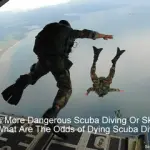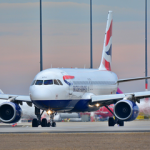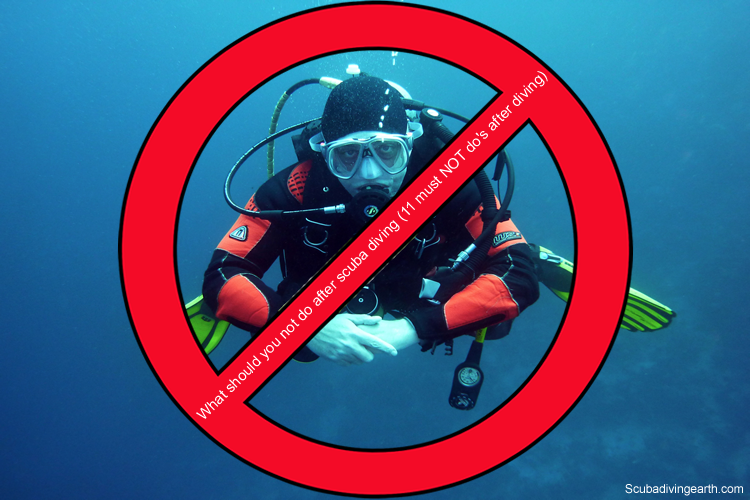
There are a few activities you should not do straight after scuba diving for your own safety.
11 things you should NOT do after scuba diving:
- Fly on a plane.
- Travel to altitude or mountain climbing.
- Strenuous exercise.
- Drink alcohol in excess.
- Have a hot shower or bath.
- Have a deep tissue massage.
- Free dive.
- Parachute jumping or skydiving.
- Paragliding.
- Parasailing.
- Air ballooning.
Let’s now take a look at these 11 things in more detail.
The best way to do more diving is to book yourself on a scuba diving liveaboard. You can check the latest and best deals on liveaboards using the following window:
The 11 things you should not do after diving in more detail
Here’s the above list of activities you should not do after scuba diving, which are explained in more detail. Each one begins with the questions asked by those keen on scuba diving.
1. Can we fly after scuba diving?
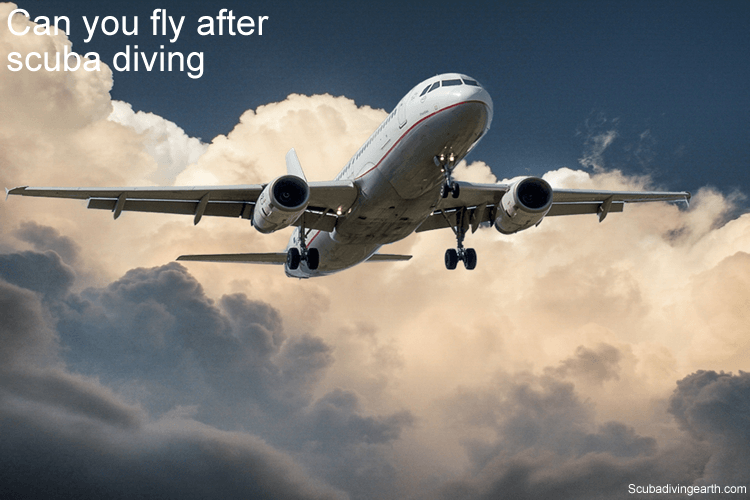
Top of the list of things you must not do after scuba diving is flying. Flying is known to be a risk to scuba divers, and must be avoided. You must not get straight on an aeroplane immediately after you’ve scuba dived. Please read on for more details and why this is the case.
How long should you wait to fly after scuba diving?
The best recommendation for your own safety is to wait a full 24 hours after your last dive before you fly. If you’re on holiday, keep the last day as a non-dive day.
This is for your own safety and will avoid the risk of getting the bends or decompression sickness.
More Reading: Can You Die From The Bends? (Dysbarism Treatment)
Here’s a list of organisations and their recommended time interval before flying after scuba diving:
- The Divers Alert Network recommend for a single no-decompression dive (I amend this to no decompression stop dive), a minimum preflight surface interval of 12 hours is suggested. For multiple dives per day or multiple days of diving, a minimum preflight surface interval of 18 hours is suggested. For dives requiring decompression stops, a preflight surface interval substantially longer than 18 hours appears prudent.
- The U.S. Navy tables recommend that you wait at least two hours before you board a plane after diving.
- The US Air Force recommends 24 hours after any dive.
- PADI or the ‘Professional Association of Diving Instructors’ recommends for single dives, a minimum preflight surface interval of at least 12 hours. But for repetitive dives, or multiple days of diving a minimum preflight surface interval of at least 18 hours is recommended.
- Flying After Diving guidelines say divers should not ascend to a high altitude within 12 hours of completing a single dive or 18 hours after doing multiple dives.
- The FAA’s Airman’s Information Manual (AIM) recommends that a pilot (or it is assumed, their passengers) should wait at least 12 hours prior to flying to altitudes up to 8,000’ (MSL) if a dive has not required a “controlled ascent” (non-decompression stop diving) and at least 24 hours after diving in which a “controlled ascent” (decompression requiring) is required.
More Reading: How Deep Can You Dive Without Decompression (No Decompression Stop Limits)
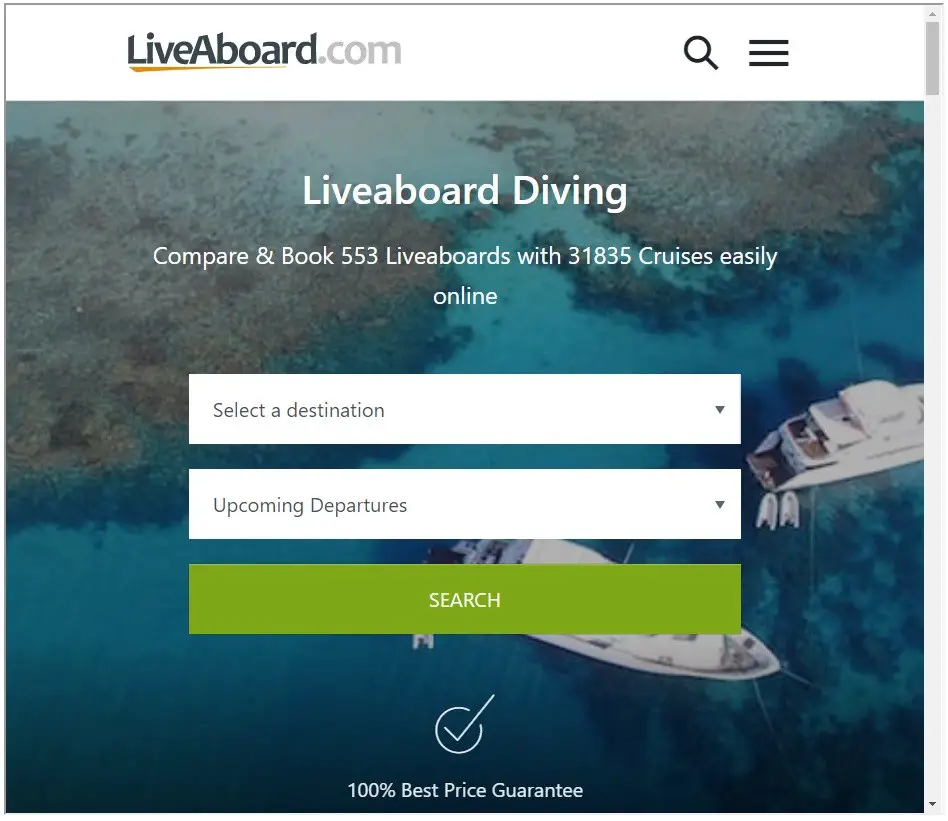
Better to be safe than sorry and wait 24 hours before you fly
The above list ranges from a two hour dive interval before flying up to a 24 hour wait time before getting in a plane. My recommendation is to use the longer of all the above periods, i.e. 24 hours.
Before you fly, you should wait!
In case of a deeper dive, which includes dives to deeper than 15 metres (50 feet), you’re definitely better to plan for a no-flight time of 24 hours after a dive. Your body has to “off-gas” after any dive. The deeper the dive, the more accumulated nitrogen and the more off-gassing is required.
In a similarly way, if you’ve dived several times each day of your trip, you should wait at least 24 hours before flying!
More Reading: What Is Deep Diving For Scuba Divers? (26 Tips For Deep Scuba Diving)
Can you fly within 24 hours of scuba diving?
Whilst the U.S. Navy tables recommend that you wait at least two hours before you board a plane after diving, my personal opinion is this is way too short.
In the above list, the U.S. Air Force says you should wait 24 hours after every dive and I think this is sound advice. Whereas Divers Alert Network (DAN) recommend a 12-hour minimum surface interval before flying. However, DAN increase this wait time to a 24 hour dive interval for repetitive dives.
Why should you not fly after scuba diving?
During the course of a dive you build up nitrogen in your body. During your ascent to the surface, your body will expel or ‘off-gas’ some of the nitrogen built-up.
But your body will still have a certain amount of nitrogen left in your tissues. This means you need to wait before you fly. The reason being is that at altitude the air pressure is lower than at sea level.
This means the nitrogen will expel quicker and you could end up with decompression sickness on the aircraft. Whether you wait 12 hours, 18 hours or even 24 house, there are no guarantees you won’t get decompression sickness. There are a number of factors that affect your propensity to decompression sickness.
Modern aircraft cabins are pressurised to the equivalent of around 2400 meters (8000 feet) of altitude above sea level. The reduced pressure at this altitude can speed up nitrogen off gassing. The increased speed of nitrogen off-gassing can lead to the formation of bubbles and decompression sickness occurs.
More Reading: How long should you wait to fly after diving? (What’s safe?)
“Pressurization systems are designed to keep the interior cabin pressure between 12 and 11 psi at cruise altitude. On a typical flight, as the aircraft climbs to 36,000 feet, the interior of the plane “climbs” to between 6000-8000 feet.”
Aircraft Pressurization Beginner’s Guide – Aerosavvy.com
Always remember that the longer your pre-flight surface interval time, the more nitrogen you’ll expel or off-gas from your system. This will therefore minimise your risk of decompression sickness.
More Reading: 12 Decompression Sickness Risk Factors In Scuba Diving and How to Avoid Them
Can I fly before scuba diving?
Some ask whether you can fly before scuba diving. The answer is yes you can, as there’s no similar risk of flying prior to a scuba dive.
Use a dive computer to check your nitrogen saturation levels before flying
Most scuba divers use dive computers to dive these days. A dive computer will normally have a ‘no-fly’ warning displayed on its screen until such time as you are clear to fly. I recommend you use this for guidance, but then for absolute safety, wait 24 hours in any case.
The reason I say to wait for 24 hours is your dive computer doesn’t know your specific situation. How old you are. How fit you are. What are your hydration levels? What is your body mass and are you over weight? How much alcohol have you drunk both before and after your dive? Are you a smoker or a do you vape?
Each of these things will affect how quickly you decompress and I would always prefer to be safe myself.
More Reading: Can You Scuba Dive If You Smoke Cigarettes (What Are The Risks?)
More Reading: To Vape Or Not To Vape, That’s The Question (Vaping And Scuba Diving)
2. Can you climb a mountain after diving?
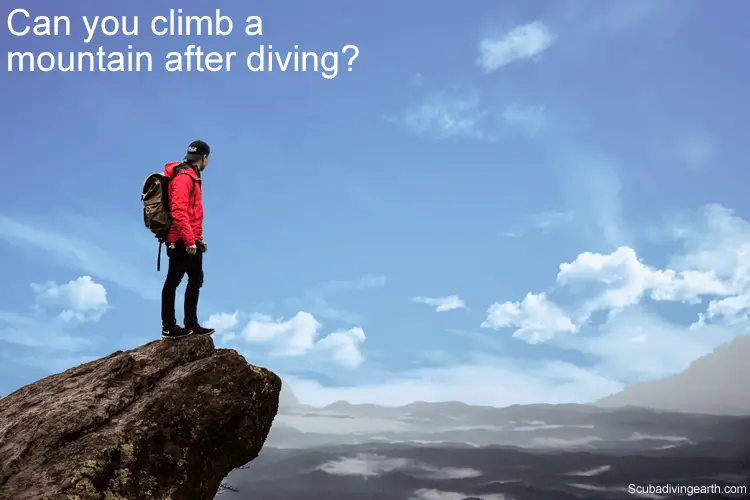
Mountain climbing exposes you to similar risks as flying. This is due to the same pressure changes at altitude, which happens as you climb a mountain.
The same potential risks applies to travelling to altitude, even if this is in a vehicle. It also applies to zip-lining and bungee jumping where the activity is taking place at altitude.
Whilst ziplining as an activity in itself is fine, the problem is the altitude at which it’s done. An example of the potential risks involved, ziplining companies usually state in their T’s & C’s that they will not allow people to zipline if they’ve been scuba diving within the past 24 hours.
There should be no exceptions to these rules. By ignoring them will only increases your risk of getting decompression sickness (DCS).
Therefore, as with not flying straight after scuba diving, do the same for travelling to altitude, mountain climbing and any other activity at altitude like ziplining. Be safe and not sorry and avoid any altitude activity at least 24 hours after a dive.
Can you hike after scuba diving?
Going for a hike in the mountains after a dive can be risky, as this is an activity at altitude. Aside from the physical activity of hiking (see below), it’s the reduced air pressure that puts you at risk of DCS.
After researching and reading many articles, it appears there are differing opinions about the maximum height you can go to within 24 hours of diving. If you fancy reading this long forum post, which includes comments from pilots, doctors and others, there seems to be a general consensus that you should limit your height to less than 300 meters (1,000 feet) after a scuba dive.
3. Can I exercise after scuba diving?
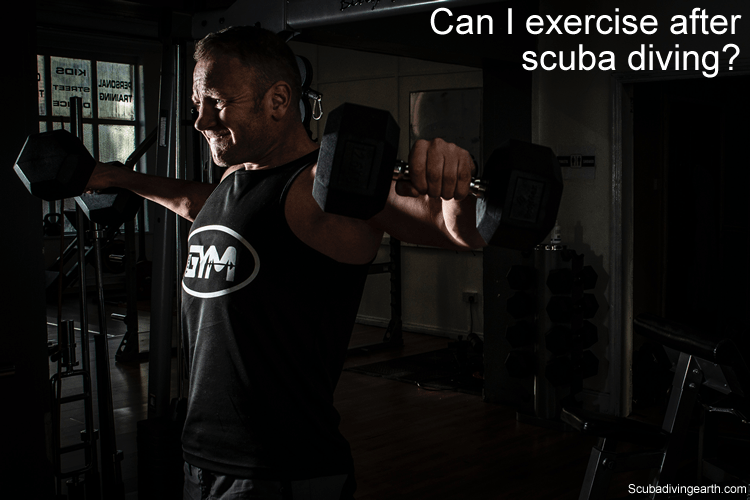
Whilst there’s no reported evidence that exercising or doing any form of physical activity after scuba diving is linked to decompression sickness, the general guidance is to avoid strenuous exercise straight after a dive.
“Conducting intense physical exercise too close to diving activity can be problematic for more fundamental reasons. To reduce the risk, it is a good idea to avoid intense exercise 24 hours before and after diving.”
Juggling Physical Exercise and Diving – Divers Alert Network
To be a safe scuba diver, I suggest you follow the DAN guidance and avoid hard exercise for 24 hours after scuba diving. This is especially true when you’ve been involved with long, deep, or repetitive dives.
For example, if you’ve been on a liveaboard trip where you’ve probably dived 2-3 dives per day, I wouldn’t suggest you dive straight into running a marathon or go to the gym for a hit workout.
More Reading: 10 Compelling Reasons Why Liveaboard Diving Holidays Are Popular
Can I exercise before scuba diving?
As with exercise after scuba diving, the general guidance is to not do any intense exercise immediately before scuba diving. Similar to exercising after scuba diving, there’s no real substantive evidence to backup this advice.
However, DAN suggest avoiding intense exercise 24 hours before a dive too.
4. Can I drink alcohol after scuba diving?

During all my time scuba diving it’s been well known that like other people, scuba divers like a drink, or two. I’ve been on many dives where quite a few of the divers had drunk heavily the night before, but without serious incident on the dives. The same is true after a day’s diving, most of the divers would drink alcohol and some quite heavily.
Alcohol is available in most dive locations and on all diving liveaboards, so unless you make the decision yourself to not drink alcohol, its not necessarily seen as a problem.
Having said this, drinking before or after a dive is not always advisable. Alcohol has a dehydrating effect on your body as it’s a diuretic. This may affect your off-gassing of nitrogen and it could increase your risk of decompression sickness.
Whilst you shouldn’t take this as gospel, as I’m not a trained medical doctor, I think that everything in moderation when it comes to drinking alcohol after scuba diving. The odd drink or two is unlikely to affect you, but a skin-full might.
5. Is it safe to take a hot shower or have a bath or get into a hot tub or Jacuzzi after scuba diving?
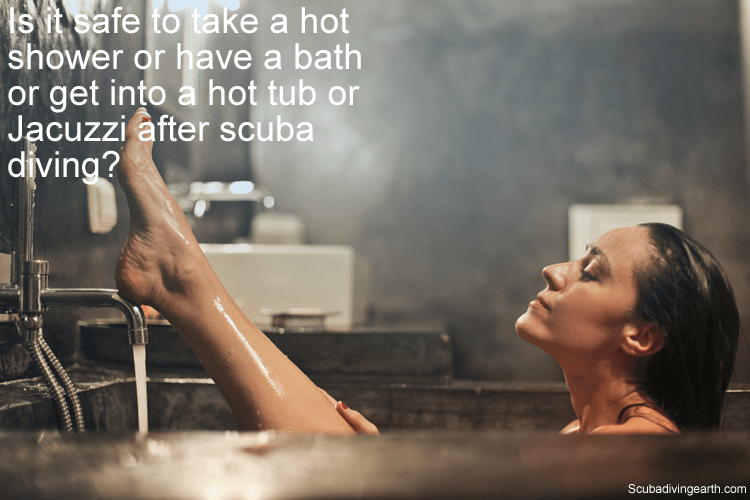
Jumping into a hot shower, or taking a bath or getting into a hot tub or Jacuzzi and the affect it has on you after a dive will depend on a few factors.
If you’re diving in cold waters, for example. Plus if you’re diving to depth for long periods and possibly even needing a decompression stop or two. These would be more likely to affect you if you jump straight into a hot shower or a hot tub.
But on the other hand, if you’re diving in warm waters and you’re not diving to extremes, the affect of jumping into a hot tub immediately after your dive is less likely to have an adverse effect.
Temperature affects off-gassing
The solubility of gas and how it expands is inversely related to temperature. You will witness this as water boils in a kettle or pan. You’ll notice that the bubbles form the closer to boiling point the water gets.
Your body tissues will hold less gas in solution as they warm up. Therefore, arguably, as the tissues warm up in a hot tub or hot bath or shower, this could promote bubble formation.
More Reading: Boyle’s Law Scuba Diving (Diving Physics For Dummies)
“Getting into a hot tub immediately after diving does alter decompression stress Decompression safety, as with many things, is a matter of balancing strings of decisions so the net outcome is in your favor. My approach is to stack as many factors as feasible in my favor to compensate for the Murphy effect or chance that we see frequently in decompression sickness.”
Neal W. Pollock, Ph.D. Divers Alert Network on Is it safe to go into a hot tub or jacuzzi after diving? Is it also safe to take a hot shower?
Why is it dangerous to take a hot shower after scuba diving?
After reading the above article by Pollock Ph.D, it seems to me that waiting for a short period after a dive would be prudent before jumping into a hot shower. Or be cautious and reduce the temperature of the shower.
6. Is it safe to have a massage after a dive?
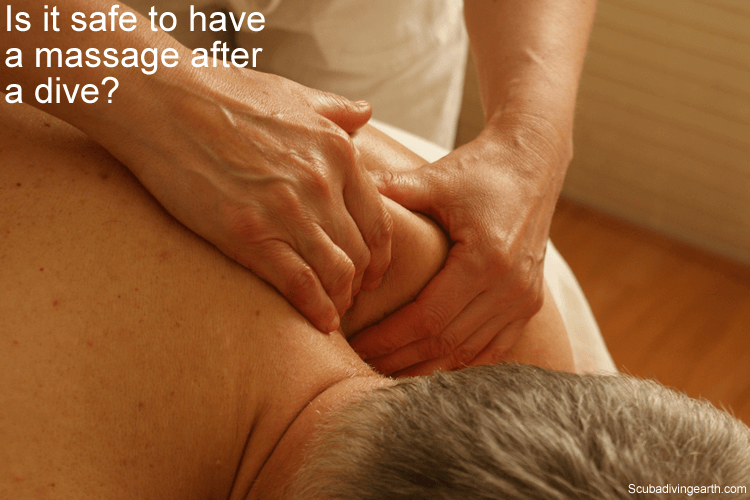
Whilst there’s no evidence to suggest that a massage after a dive can be attributed to decompression sickness, the general advice is to avoid a deep tissue massage immediately after diving.
“There is no clear sense of what massage might do and this effect would likely vary depending on dive profiles and intensity of the massage. We should note that massage has not been confidently associated with any of the cases of DCS that have come to us, and we are not aware of any study done to address this question. The clearest piece of advice is that deep tissue massage should probably be avoided, so that the potential of post-dive pain and diagnostic confusion are minimized.”
Dr. Nick Bird MD – Divers Alert Network Massage & Diving FAQs
Whereas the main concerns with a deep tissue massage include an increased blood flow, which might lead to bubble formation. Plus it may lead to muscle soreness, which could lead to a misdiagnosis of decompression sickness. I’d therefore suggest that a gentle relaxation massage is probably okay after a dive.
7. Can you freedive after scuba diving?
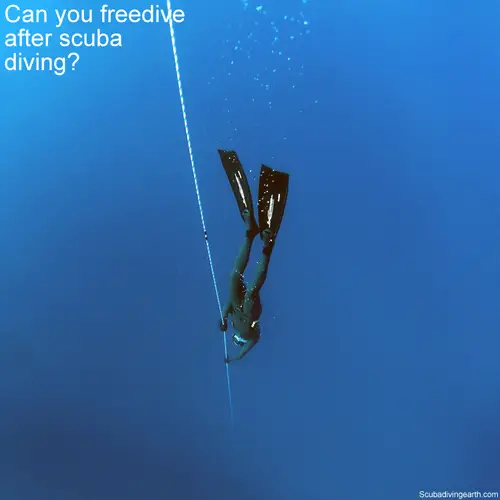
It’s unlikely you’re going to attempt a free dive immediately after a scuba dive, but it’s worth putting this activity in for completeness.
But if you are a free diver as well as a scuba diver, you should follow the same rules as for flying after a dive. These are as per DAN, which is: After a single no decompression stop dive, wait 12 hours before freediving. After multiple no decompression stop dives, or multiple dives wait 18 hours. After a dive requiring a decompression stop, wait 24 hours.
8. Can you skydive after scuba diving?
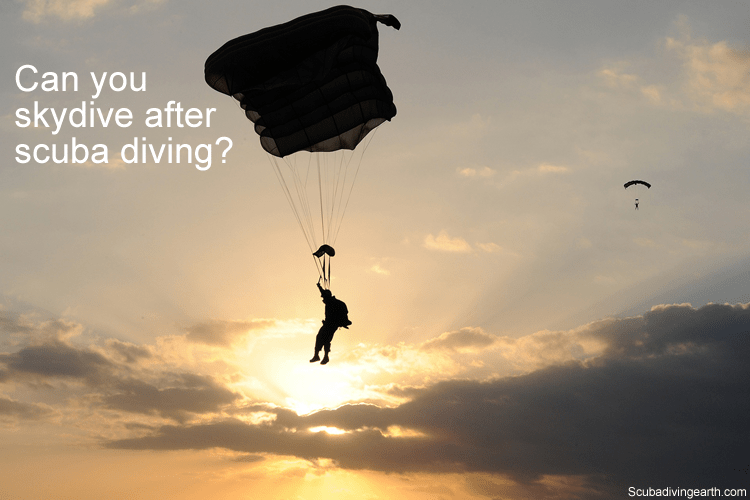
If you are a scuba diver and a skydiver, please keep in mind not to skydive or do a parachute jump at least 24 hours after your scuba dive.
As with flying and the advice from the various official bodies, the guidance is to wait 12 hours after a single no decompression stop dive, but longer after repetitive or decompression stop dives and up to 24 hours before flying.
But for extra safety and precaution, I’d say not to skydive and scuba dive in the same day and wait the full 24 hours.
Can you skydive and scuba dive in the same day?
Depending on which way around you do these activities, depends on whether you can skydive and scuba dive in the same day. As already discussed above, skydiving after scuba diving is not recommended without a reasonable surface interval.
However, there’s nothing to prevent you from skydiving before you scuba dive. So you could potentially skydive in the morning and dive in the afternoon. You could even parachute to your scuba dive if you’re really adventurous!
More Reading: Is scuba diving more dangerous than skydiving
9. Can you paraglide after scuba diving
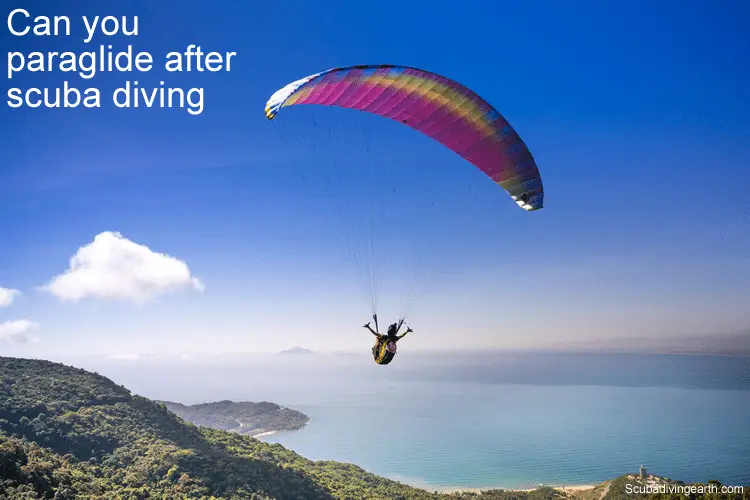
Like skydiving, flying and mountain climbing, paragliding is an altitude sport. I’d say you follow the same official guidelines for paragliding as those for flying noted above. These are, as follows (note I have inserted paraglide instead of flight):
- For a single no-decompression stop dive a minimum pre-paraglide surface interval of 12 hours.
- Multiple dives per day or multiple days of diving, a minimum pre-paraglide surface interval of 18 hours is suggested.
- Dives requiring decompression stops, a pre-paraglide surface interval substantially longer than 18 hours appears prudent.
My suggestion for your own safety is that you wait at least 24 hours after you’ve dived before you go paragliding.
But then there’s nothing stopping you from paragliding before you scuba dive though.
10. Can you go parasailing after scuba diving?
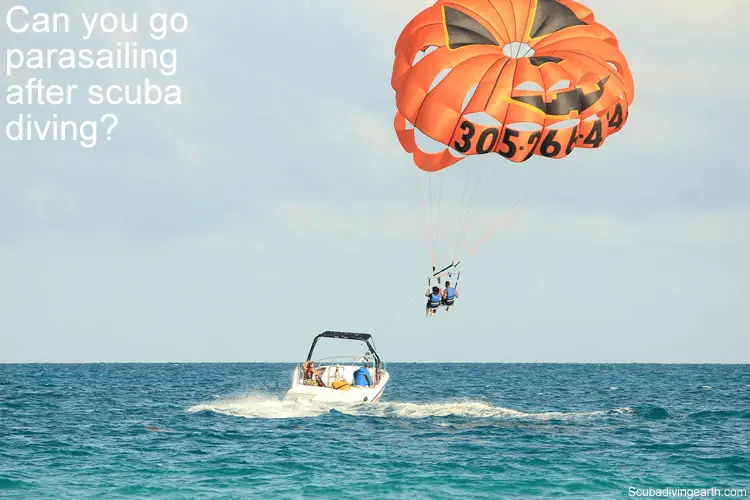
Going parasailing after scuba diving shouldn’t be a problem, as you generally don’t go any higher than 150 metres (500 feet). Up to around 300 metres (1,000 feet), there’s a very small pressure change that occurs.
However, if you want to be uber-safe, you could do the parasailing before you scuba dive, or wait a few hours after your dive before you do the parasail.
“The FAA (Federal Aviation Administration) limits parasails to fly no higher than 500 vertical feet from the surface of the earth (CFR 101.13). 500 feet up is about how high you will get on an 800 ft towline.”
Marine Del Rey Parasailing FAQs
11. Can you go air ballooning before scuba diving
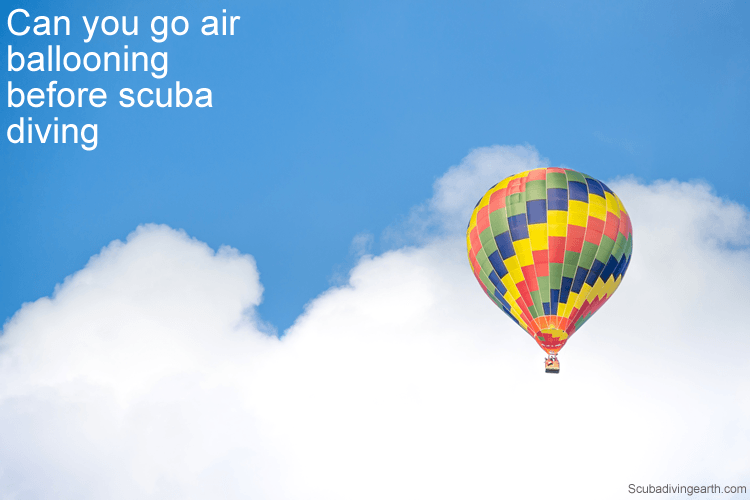
Air Ballooning is a form of flying. Just like flying in an aeroplane after scuba diving, it’s recommended to not fly in an air balloon until a sufficient surface interval has elapsed.
I suggest you follow the same guidance as discussed above with regards to going in a hot air balloon. You are probably best to wait a full 24 hours before hot air ballooning after you’ve been scuba diving.
I hope you enjoyed this article about what should you not do after scuba diving
I’d love to hear from you. Tell us about your adventures of diving and snorkeling, in the comments below. Please also share your photos. Either from your underwater cameras or videos from your waterproof Gopro’s!
If this article hasn’t answered all of your questions. If you have more questions either about snorkeling or types of scuba diving (or specifically about what should you not do after scuba diving), please comment below with your questions.
There will also be many more articles about scuba diving (and snorkeling) for you to read and learn about these fabulous sports.
Have fun and be safe!

